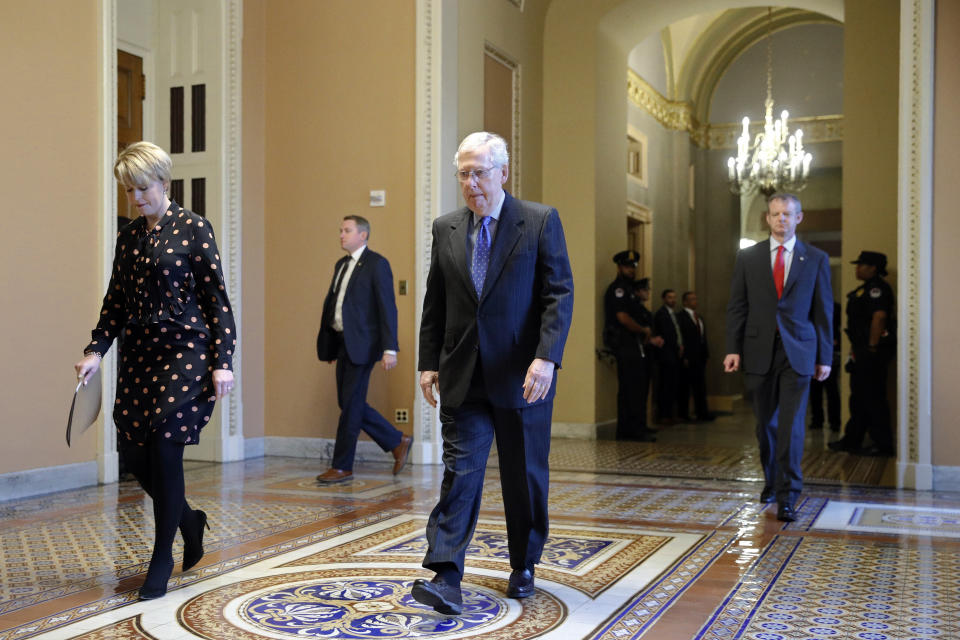Trump and McConnell are the biggest big-government Republicans ever
Just as there are no atheists in foxholes, there are no small-government Republicans in an economic crisis.
President Trump and his Senate ally, Republican Majority Leader Mitch McConnell of Kentucky, are marshalling the biggest expansion of government spending since World War II, according to a Yahoo Finance analysis of the latest Congressional Budget Office estimates. Government spending in 2020 is likely to hit at least 30% of GDP, thanks to the coronavirus recession and an enormous set of stimulus spending Congress passed during the last six weeks. During the last recession, in 2009, spending peaked at just 24.4% of GDP. The highest level before that was during World War II in 1945, at 40.7% of GDP.
In March, before Trump declared a national emergency and most states enacted stay-at-home orders, CBO forecast federal spending to be 21.3% of GDP. That was modestly higher than prior years and the highest level since 2012. But four rounds of stimulus spending and a rapidly shrinking economy have put fiscal math on a completely different trajectory than at any time during the last 60 years.

The irony is obvious, as McConnell is a traditional small-government Republican who has long wanted to rein in big programs such as Medicaid and Social Security. For years, Republicans have pushed “reforms” such as privatizing Social Security and funding Medicaid, the health program for the poor, with “block grants” to the states that would effectively reduce funding. Some Republicans back a “starve the beast” strategy meant to reduce federal revenue through tax cuts like the 2017 law Trump and McConnell championed, then cut spending because there’s not enough revenue to cover it.
The coronavirus pandemic has shattered that approach. The four stimulus bills passed since mid-March entail $3.6 trillion of aid that will add around $2.4 trillion to the national debt this year and next. CBO has now raised its estimate of the 2020 deficit from $1.1 trillion to $3.7 trillion. (Not all stimulus adds to the deficit because some is in the form of loan guarantees, not outright spending.)

Unlike some fiscal hawks in the Republican party, Trump has never opposed large deficits or borrowing to fund favored programs—and he relied heavily on debt as a real-estate developer. He has hinted that he might support cuts to Medicare, but then recanted. And Trump has wanted a big infrastructure spending bill since he took office in 2017.
While Republicans control the Senate, Democrats control the House, where Speaker Nancy Pelosi and most members of her party are more comfortable spending on social programs and other forms of aid. Trump’s point man on bailouts, Treasury Secretary Steven Mnuchin, is a relative moderate who has donated to Democrats in the past, including Hillary Clinton when she was a New York senator. Mnuchin reportedly works well with Pelosi, leading some conservatives, including writers of the Wall Street Journal editorial page, to hint McConnell is getting snookered by a Mnuchin-Pelosi cabal.
There’s a lot left to fight over. Pelosi and other Democrats are pushing for a lot more stimulus, including billions for states and cities that have to balance their budgets and could lay off millions if they don’t get help from Washington. McConnell recently suggested bankruptcy as an option, then backed off amid outrage from Democrats. But that was McConnell’s effort to assert some control over a gusher of spending he’s done nothing to impede, so far.
McConnell has called the Senate back to work on May 4, while the House remains closed. Beacon Research says that’s an effort to get a jump on the next bailout package, and parry Pelosi’s likely call for more generous spending. “Conservative, small government Republicans have been growing increasingly concerned about continuing to shovel money out the door,” Beacon Research explained in a note to clients on April 29. “The trillions of dollars that have been sent to individuals and small businesses goes against all of their natural instincts and the reason many of them were elected.” We’ll find out in November if voters are more forgiving in the midst of a severe recession.
Rick Newman is the author of four books, including “Rebounders: How Winners Pivot from Setback to Success.” Follow him on Twitter: @rickjnewman. Confidential tip line: rickjnewman@yahoo.com. Encrypted communication available. Click here to get Rick’s stories by email.
Read more:
Why China tolerates animal markets that produce deadly viruses
These Republican states are ignoring Trump’s reopening guidelines
Get the latest financial and business news from Yahoo Finance
Follow Yahoo Finance on Twitter, Facebook, Instagram, Flipboard, SmartNews, LinkedIn, YouTube, and reddit.



